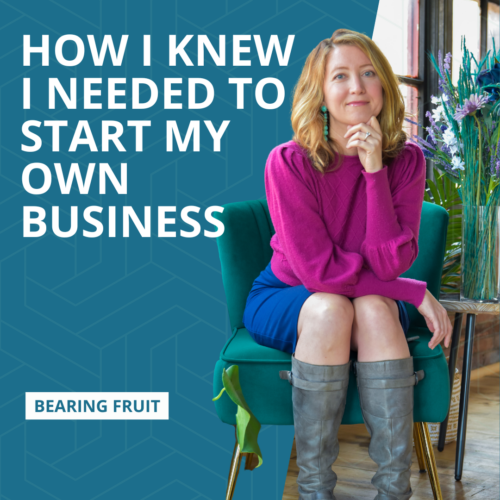How I Knew I Needed To Start My Own Business
I absolutely did not intend to be an entrepreneur. Had I done so, I would have likely pursued an MBA – which, in hindsight, woulda been a huge mistake. The strength of my business, what gives me so much appeal, is my deep subject matter knowledge. You know, the degrees I pursued instead of an MBA.
But when I was sitting in a coffee shop parking lot, texting a friend, “I think I’m going to get fired” I knew I could run a business better than my boss. This dude could write a grant (and so could I) but he had no idea how to run a company.
In hindsight, there were some clear indications that I needed to work for myself:
I was a bad employee.
Indeed, I’ve had more than one boss refer to me as “insubordinate.” Which would have hurt my feelings had I not already been called “oppositional” by many a teacher throughout my public education experience.
I can’t follow directions. I mean, technically I CAN. But if the directions lack logic or ethics or reason, if they’re unclear or a blanket punishment for one person’s miscalculation, I struggle to abide on principle.
When the head admin would comment “leaving early, are we?” because I was walking out at 3pm when I’d been in the office since 6am and worked a focus group during evening hours the night before, I knew that the concept of a 9 to 5 didn’t square with my work style.
When the hours you spend with your butt in the seat matter more than the fact you could spend those hours playing solitaire, and that makes you mad, you aren’t cut out for a corporate work ethic.
I needed support.
My independent streak might have backfired a bit. Here’s how: I was hired to fill a position that had been formed through a grant. Which meant my job would be up as soon as the grant was over. Unless more grants came in.
And I guess because I showed up eager and smart they thought I could write these grant proposals by myself?
I had not an ounce of experience. You might not be surprised to learn that my first grant proposal was rejected. And the reviewers took the extra special step of calling us up to tell us how totally off-base the proposal was. Thank goodness this was before Zoom because my face was deep red with embarrassment on that conference call.
But right behind that red embarrassment was also some anger. That I was brand new to the job and had been given zero oversight. No one even reviewed the proposal before I sent it in.
I can look back at that now and see that I needed a mentor. When you work for someone else, mentors aren’t guaranteed, even if you have multiple bosses in the org chart. When you work for yourself, you can hire a mentor.
I had ***ideas***.
Girl, let me tell you. I had dream clients to pursue. Projects I’d crafted on paper. Data visualization to invent. There was a world to change.
When I brought in guest speakers, arranged events in their honor, and connected them with local non-profits, my office cheered me on – so long as I did all of those things outside of my work hours.
When it came to anything innovative that would require the company to pay for my time, I was vetoed. And when my good ideas didn’t get heard I would become disobedient.
I began with micro-rebellions. I stopped following the sign taped to the bathroom mirror (only in the ladies bathroom don’t ask how I know that) directing us to wipe down the sink with a paper towel.
The more I felt undervalued, the less I cared about the company, to the point where my boss commented that I looked “sullen” and needed to “smile more.” >screams into the void<
Was I really just gonna phone it in for the next forty years instead of fulfilling my mission on this earth?
I had ***ideas*** for other people.
“You know what would be so cool?”
☝🏼 I say this on a daily basis.
Wanna know how this conversation ends? 👇🏼
“That’s a really good idea, thank you!” >scribbles notes<
That inventiveness is how I launched 3 successful companies. It’s how I teach other accidental entrepreneurs to scale up without breaking down. Inventing game-changing solutions is my favorite part of Boost & Bloom Office Hours.
If you’re also endlessly good at spotting inefficiencies and obstacles AND seeing your way around them, you’ll be good at being a founder too.
When you’re curious about the project’s budget and want to understand how it’s conceived and in the process you have fresh ideas about ways to lower the overhead, you might be cut out to work for yourself.
When you invent a newsletter campaign for the outreach manager because you “just love this sort of thing,” you should consider a job where marketing is one of your many responsibilities.
When you’re as comfortable in business development as you are doing The Actual Work, it’s a sign you should start your own company.
Is this resonating? What would you add? How do you know you should work for yourself? Write me with your ideas.
Here’s to no one ever telling you your coffee break was two minutes longer than allowed.

